Unit 5 Amazing things Period 2 Reading 课件(共65张PPT)
文档属性
| 名称 | Unit 5 Amazing things Period 2 Reading 课件(共65张PPT) |
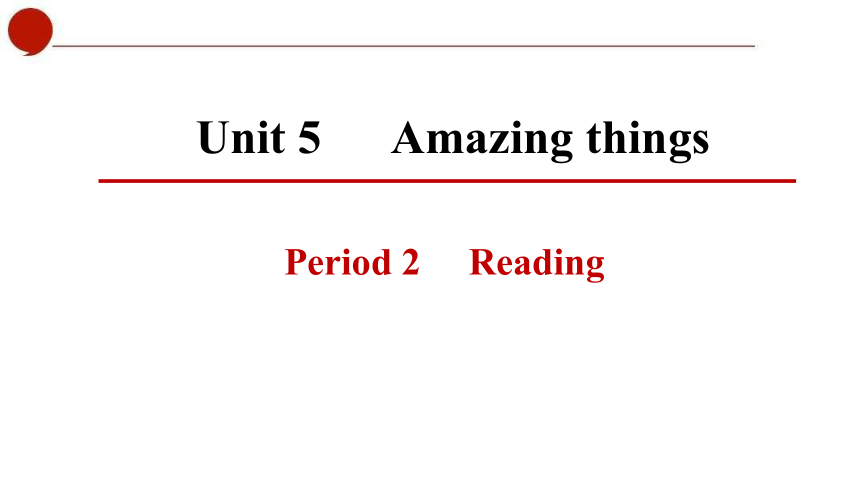
|
|
| 格式 | ppt | ||
| 文件大小 | 31.0MB | ||
| 资源类型 | 教案 | ||
| 版本资源 | 牛津译林版 | ||
| 科目 | 英语 | ||
| 更新时间 | 2023-05-18 17:39:02 | ||
图片预览

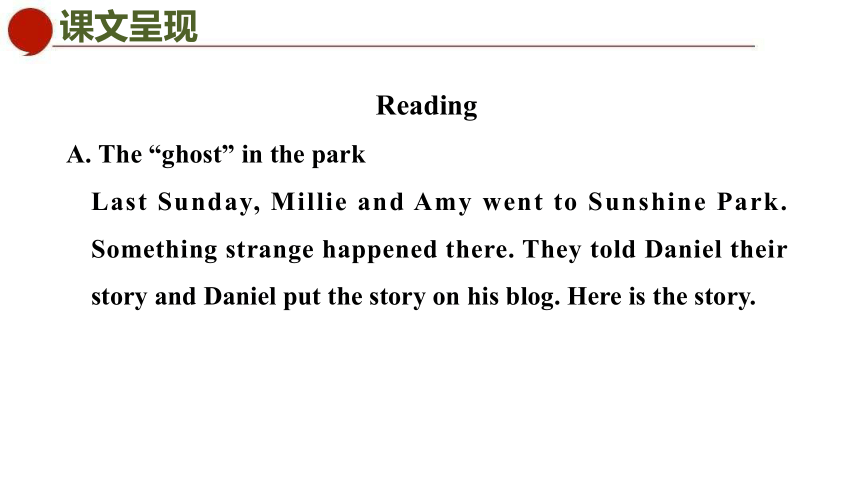
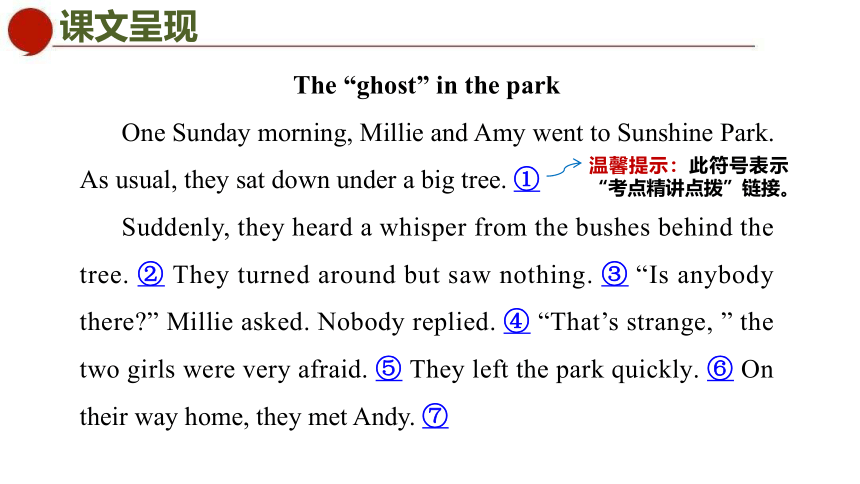
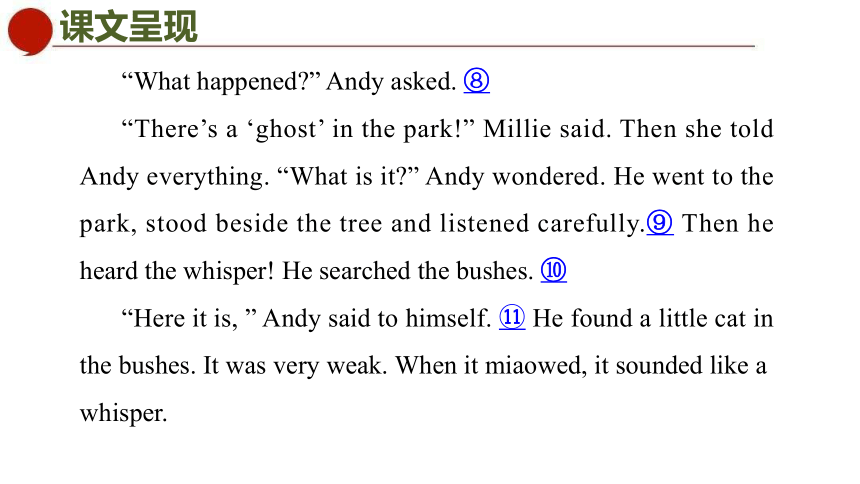
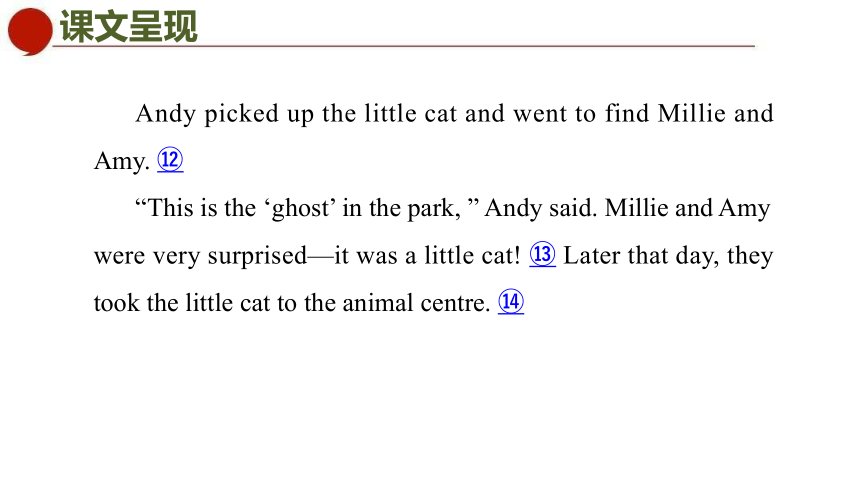
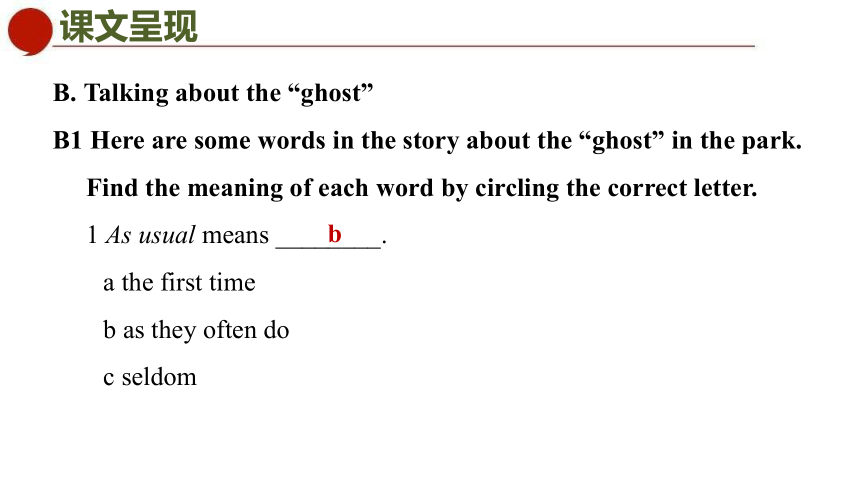
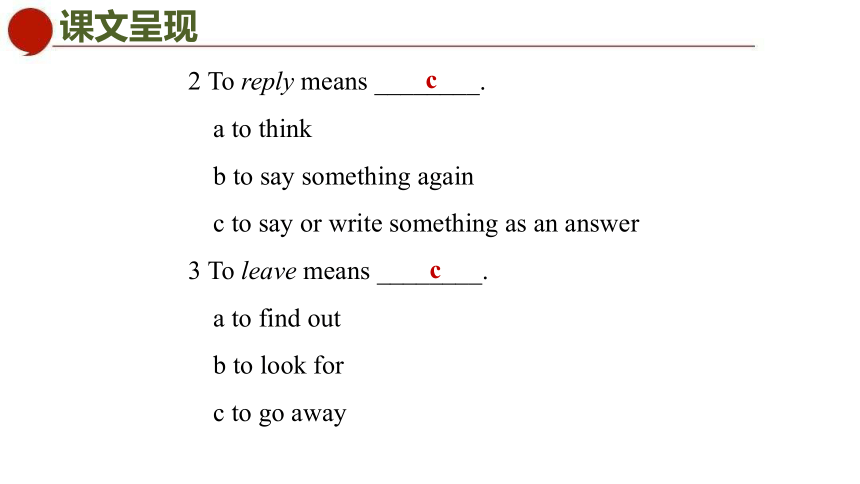
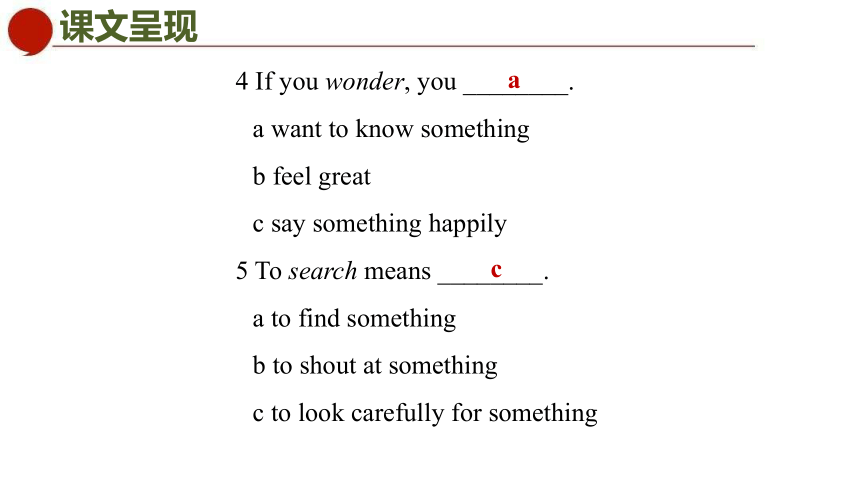
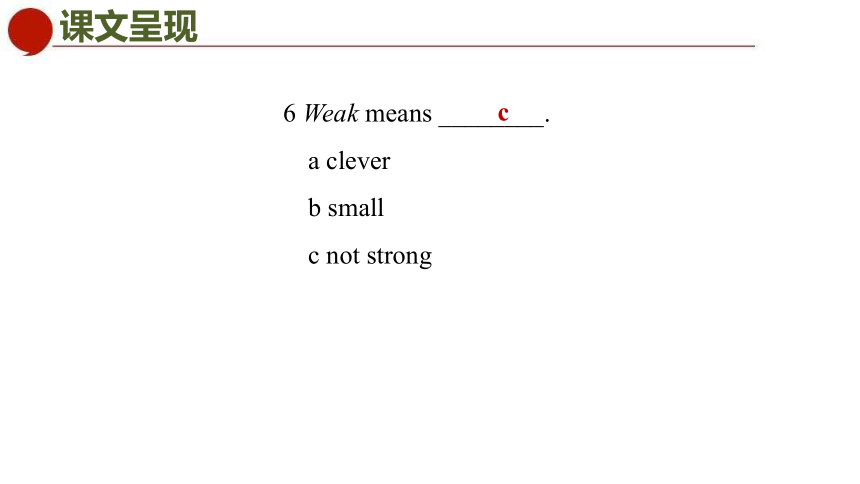
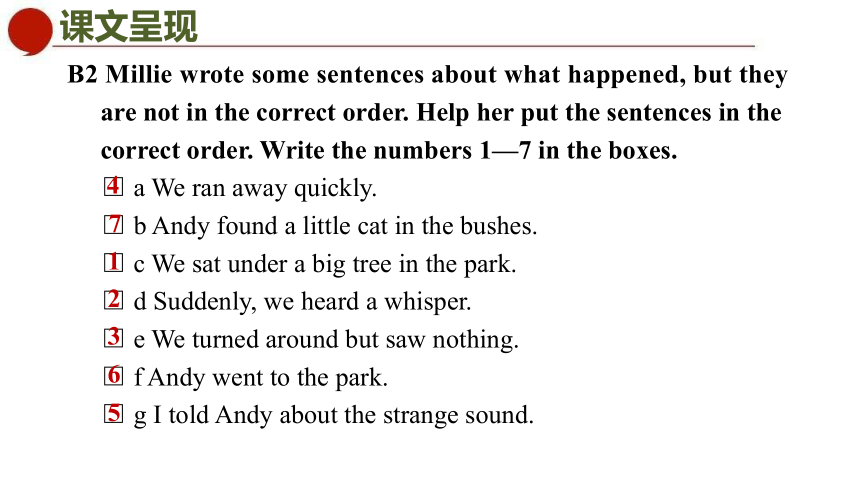
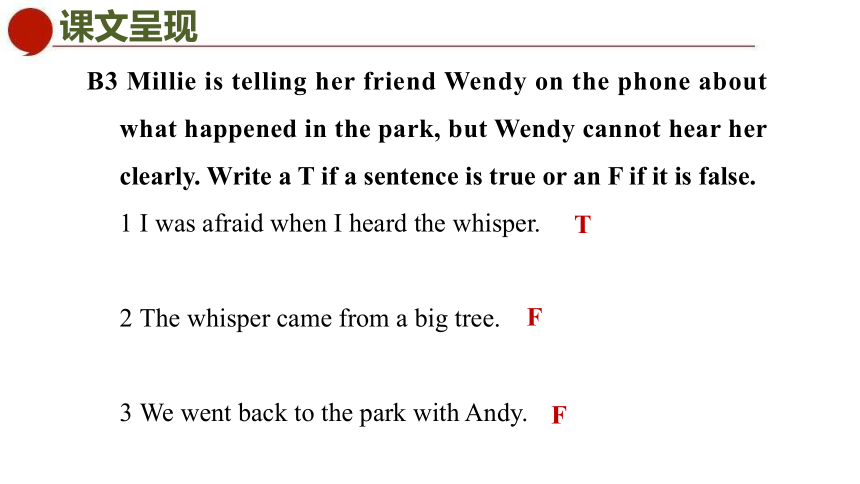
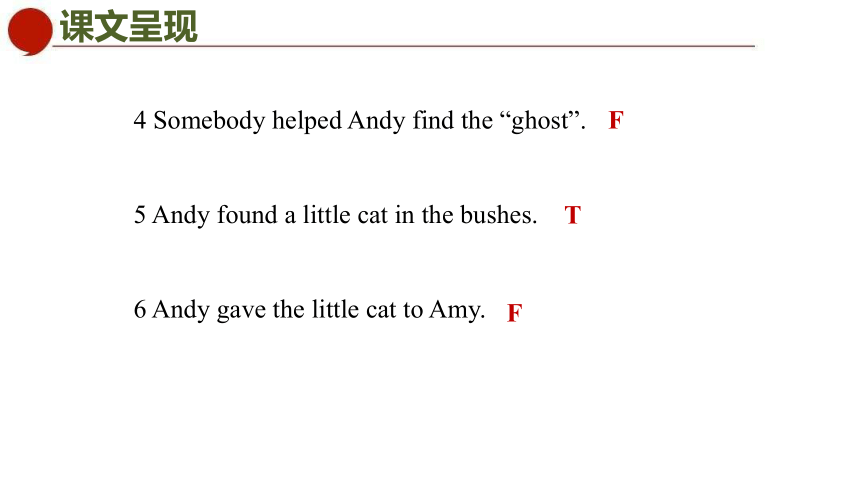
文档简介
(共65张PPT)
Period 2 Reading
Unit 5 Amazing things
Reading
A. The “ghost” in the park
Last Sunday, Millie and Amy went to Sunshine Park. Something strange happened there. They told Daniel their story and Daniel put the story on his blog. Here is the story.
The “ghost” in the park
One Sunday morning, Millie and Amy went to Sunshine Park. As usual, they sat down under a big tree. ①
Suddenly, they heard a whisper from the bushes behind the tree. ② They turned around but saw nothing. ③ “Is anybody there ” Millie asked. Nobody replied. ④ “That’s strange, ” the two girls were very afraid. ⑤ They left the park quickly. ⑥ On their way home, they met Andy. ⑦
温馨提示:此符号表示“考点精讲点拨”链接。
“What happened ” Andy asked. ⑧
“There’s a ‘ghost’ in the park!” Millie said. Then she told Andy everything. “What is it ” Andy wondered. He went to the park, stood beside the tree and listened carefully.⑨ Then he heard the whisper! He searched the bushes. ⑩
“Here it is, ” Andy said to himself. He found a little cat in the bushes. It was very weak. When it miaowed, it sounded like a whisper.
Andy picked up the little cat and went to find Millie and Amy.
“This is the ‘ghost’ in the park, ” Andy said. Millie and Amy were very surprised—it was a little cat! Later that day, they took the little cat to the animal centre.
B. Talking about the “ghost”
B1 Here are some words in the story about the “ghost” in the park. Find the meaning of each word by circling the correct letter.
1 As usual means ________.
a the first time
b as they often do
c seldom
b
2 To reply means ________.
a to think
b to say something again
c to say or write something as an answer
3 To leave means ________.
a to find out
b to look for
c to go away
c
c
4 If you wonder, you ________.
a want to know something
b feel great
c say something happily
5 To search means ________.
a to find something
b to shout at something
c to look carefully for something
a
c
6 Weak means ________.
a clever
b small
c not strong
c
B2 Millie wrote some sentences about what happened, but they are not in the correct order. Help her put the sentences in the correct order. Write the numbers 1—7 in the boxes.
□ a We ran away quickly.
□ b Andy found a little cat in the bushes.
□ c We sat under a big tree in the park.
□ d Suddenly, we heard a whisper.
□ e We turned around but saw nothing.
□ f Andy went to the park.
□ g I told Andy about the strange sound.
1
2
3
4
5
6
7
B3 Millie is telling her friend Wendy on the phone about what happened in the park, but Wendy cannot hear her clearly. Write a T if a sentence is true or an F if it is false.
1 I was afraid when I heard the whisper.
2 The whisper came from a big tree.
3 We went back to the park with Andy.
T
F
F
4 Somebody helped Andy find the “ghost”.
5 Andy found a little cat in the bushes.
6 Andy gave the little cat to Amy.
F
T
F
B4 Henry, Andy’s friend, is asking Andy about the “ghost”. Help Andy answer his questions.
Henry: What did Millie and Amy hear
Andy: They heard a (1)_________. They were very (2) _________ and left the park quickly.
Henry: What did you find
Andy: I found a little cat in the (3) _________.
whisper
afraid
bushes
Henry: Why did the little cat sound like a ghost
Andy: It was very (4) _________, so when it (5) _________, it sounded like a whisper.
Henry: Where’s the little cat now
Andy: We took it to the (6) _________ centre.
weak
miaowed
animal
①As usual, they sat down under a big tree.
as usual 照例; 像往常一样
e.g. As usual, he goes to work by bike.
像往常一样, 他骑着自行车去上班了。
What an unusual day! 多么不寻常的一天!
He usually goes to the park on Saturday morning.
他通常星期六早晨去公园。
考点1
中考在线1:—Did you hear anything _________ (usual) in the street
—Sorry, I’m not sure. I was cleaning the room. [大庆]
unusual
【点拨】句意:—你听到街上有什么异常的声音了吗?—对不起, 我不太确定。我正在打扫房间。根据“Sorry, I’m not sure.”可知此处表示“不寻常的”, 故填unusual。
返回
温馨提示:可返回原文
②Suddenly, they heard a whisper from the bushes behind the tree.
hear /h (r)/ v. 听见, 听说
e.g. Did you hear of /about the story
你听说过这个故事吗?
I heard from her two days ago.
两天前我收到了她的来信。
考点2
后接名词/代词,听说
hear from sb. 收到某人的来信
返回
③They turned around but saw nothing.
turn around 转身
e.g. Turn around and let me look at your back.
转过身去让我看看你的后背。
考点3
=turn round
拓展:与turn 相关的短语:
① turn on 打开(水、电等) ② turn off 关掉(水、电等)
③ turn up 调大(声音) ④ turn down 调小(声音)
⑤ turn out 结果是 ⑥ turn into 变成
中考在线2:Would you please ______ the light It’s very dark now. [黔南]
A. turn to B. turn on
C. turn off D. turn around
【点拨】考查动词短语辨析。句意:请你把灯打开好吗 现在天很黑了。turn to 向……求助; turn on 接通(电流、煤气、水等); 打开; turn off 关掉; turn around 转身。由“It’s very dark now.”可知, 应该打开灯。
B
返回
④“Is anybody there ” Millie asked. Nobody replied.
anybody /'enib di/ pron. 任何人
e.g. There isn’t anybody in the park. 公园里没有任何人。
She did as well as anybody else.
她做得比别人毫不逊色。
If anybody comes, ask him to wait.
要是有人来, 让他等着。
考点4
anybody 一般用于否定句、疑问句或条件从句。
当anybody 受定语修饰
时,定语应放在它后面
anybody 若用作主语,其谓语动词一般用第三人称单数形式,相应的人称代词和物主代词也用单数he, him, his(不一定指男性),但在非正式文体中常用复数代词 they, them, their。
中考在线3:I don’t want to be ______ else. I just want to be _______. [凉山]
A. anybody; myself B. somebody; myself
C. everybody; me D. anybody; me
【点拨】考查代词辨析。句意:我不想成为其他任何人, 我只想做我自己。anybody 常用在否定句或疑问句中; somebody 常用于肯定句或表示请求/ 建议的疑问句中; everybody 意为“每人”。第一句是否定句, 应用anybody, 第二空应用反身代词myself。
A
nobody /'n b di/ pron. 没有人
e.g. There is nobody there. 那里没有人。
No one /Nobody likes it.
没人喜欢它。
—Who went to see the film
谁去看电影了
—No one/Nobody.
谁也没去。
考点5
表单数,只能指代人
nobody 用作主语时,谓语动词一般用第三人称单数形式
no one=nobody,两者均只能指人,不能指物
在回答 who 的提问时,若要表示没人,通常用 no one 或 nobody
中考在线4:—Linda, who did you go on vacation with
—______ was free, so I went alone. [丹东]
A. Everybody B. Anybody
C. Nobody D. Somebody
【点拨】考查不定代词辨析。句意:—琳达, 你和谁一起去度假了?—没有人有空, 所以我自己去的。everybody 每个人; anybody 任何人; nobody 没有人; somebody 某人。由“so I went alone”, 可知没有人有空。
C
reply /r 'pla / vi. 回答, 答复
e.g. She didn’t know how to reply.
她不知道怎样回答。
考点6
一语辨异:We are very busy. We have to not only answer the calls, but also reply to the letters.
我们非常忙碌。我们不仅要接电话,还得回信。
辨析: answer 与reply
考向
answer 多用于“回答问题(answer the question )”或“接电话 (answer the telephone )”等。
reply 比answer 正式, 一般指经过思考、有针对性的回答。reply 作不及物动词使用时, 不能直接接宾语, 要加 to, 即reply to=answer。
e.g. Can you answer my question
你能回答我的问题吗?
He never replied to any of my letters.
他从来没给我回过信。
中考在线5:The manager made no r to the questions.
[日照]
【点拨】句意:经理没有回答这些问题。由首字母提示及句意可知, 用reply 表示“回答”。
eply
返回
⑤“That’s strange, ” the two girls were very afraid.
strange /stre nd / adj. 奇怪的
e.g. His idea is strange. 他的想法是奇怪的。
When he woke up, he found himself in a strange place.
他醒来时, 发现自己在一个陌生的地方。
Are you afraid of strangers
你害怕陌生人吗?
考点7
adj. 陌生的;不熟悉的
n. 陌生人
中考在线6:When Henry first came to Nanjing in 2010, it was all _______ to him, but he soon learnt his way around.
[南京]
A. smooth B. slight C. strange D. successful
【点拨】本题用词义辨析法。考查形容词辨析。句意:2010 年Henry 第一次来南京时, 对他来说一切都很陌生, 但他很快就熟悉了周围的情况。根据句意可知用形容词strange“陌生的”符合句意。其他选项smooth“光滑的”;
slight“轻微的”; successful“成功的”。
C
返回
⑥They left the park quickly.
leave /li v/ v. 离开
e.g. When does the train leave
火车什么时候离开
My mother often leaves her bag in her office.
我妈妈经常把她的包落在她的办公室里。
考点8
leave—left—left
“leave sth. + 地点状语”意为“把某物落在某地”。
辨析: leave 与leave for
考向
leave+ 地点 表示“离开某地”。
leave for+ 地点 表示“前往某地”。
一语辨异:Two years ago he left China for America and now he is leaving for Canada.
两年前他离开中国去了美国,现在他又要去加拿大了。
中考在线7:Parents should let children _______ home and find more about the world. After all, birds should fly freely in the sky. [山西]
A. leave B. enter C. reach
【点拨】本题用词义辨析法。考查动词辨析。句意:父母应该让孩子们离开家, 多了解世界。毕竟, 鸟儿应该在天空中自由飞翔。leave 离开; enter 进入; reach 到达; 由“find more about the world”可知, 此处表示应该让孩子们离开家。
A
返回
⑦On their way home, they met Andy.
on one’s way 在路上; 在途中
e.g. On my way, I saw the accident.
在回家的路上, 我看到了那场事故。
On her way to school, she bought some flowers.
她在去学校的路上买了一些花。
Tom hurt his leg on his way home.
汤姆在回家的路上伤了腿。
考点9
on the/one’s way
on one’s way to 后接here, there, home 等地点副词时,要省略介词to。
中考在线8:I met Nancy _______ my way home yesterday.
[徐州]
A. in B. at C. by D. on
【点拨】本题用固定搭配法。考查介词的用法。句意:昨天在回家的路上, 我遇到了南希。on one’s way home 意为“在某人回家的路上”, 为固定搭配。
D
返回
⑧“What happened ” Andy asked.
happen /'h p n/ vi. 发生
e.g. What happened to him last week
上周他发生了什么事?
It’s the best thing that has ever happened to me.
这是我所遇到的最好的事。
I happened to meet my history teacher in the street yesterday.
昨天在街上我碰巧遇见了我的历史老师。
考点10
sth. happen(s) to sb. 某事发生在某人身上
happen to do sth.恰巧做某事
happen 是不及物动词,
特别指那些偶然的或不
能预见的事“发生”。
中考在线9:—Have you met Luke recently
—Yes, I _______________________ (碰巧看见他) in the science museum yesterday afternoon. [连云港]
【点拨】表示“碰巧做某事”用短语“happen to do sth.”, 结合时间状语“yesterday afternoon”可知, 应用一般过去时。
happened to see/meet him
返回
⑨He went to the park, stood beside the tree and listened carefully.
carefully /'ke f li/ adv. 仔细地, 认真地; 小心地
e.g. Please listen carefully. 请仔细地听。
He is holding the ladder with care.
他正小心地扶着梯子。
Be careful when you cross the road.
你过马路时要小心。
考点11
n. 小心;谨慎
adj. 小心的
careful 的词形变化:
中考在线10:The sign means that we must slow down and drive _______ near the school. [东营]
A. quietly B. quickly
C. carefully D. seriously
【点拨】考查副词辨析。quietly 安静地; quickly 快速地; carefully 仔细地; seriously 严肃地。根据“slow down”及“near the school”可知, 这个标志提醒我们在学校附近要减速慢行小心驾驶。
C
返回
⑩He searched the bushes.
search /s t / v. 搜查, 搜寻, 搜索
e.g. They searched the girl but found nothing.
他们对这个女孩搜身, 但什么也没找到。
The policemen searched the woods for the lost child.
警察搜查树林, 寻找失踪的孩子。
The policemen are searching for/looking for the thief.
警察正在搜寻/ 寻找小偷。
考点12
search+ 人或地点
=look for
返回
“Here it is, ” Andy said to himself.
say to oneself 自言自语
e.g. “Where is my book ” Peter said to himself.
“我的书在哪儿 ”彼得自言自语道。
考点13
oneself
(反身代词)
常见的含反身代词的固定短语:
① hurt oneself 伤着自己
② kill oneself 自杀
③ help oneself 随便吃
④ teach oneself 自学
⑤ enjoy oneself 过得愉快
⑥ by oneself 单独地;独自地
拓展:反身代词的基本形式:
单数 myself 我自己 yourself 你自己
himself 他自己 herself 她自己
itself 它自己
复数 ourselves 我们自己
yourselves 你们自己
themselves 他/ 她/ 它们自己
中考在线11:他从地上爬起来, 自言自语道: “我能行!”(say)
He rose up from the ground and ____________________, “I can do it!
[恩施]
【点拨】本题用固定搭配法。根据rose 可知, 句子为一般过去时。表示“自言自语”可用say to oneself , say 的过去式为said, 主语He 的反身代词为himself, 故填said to himself。
said to himself
返回
Andy picked up the little cat and went to find Millie and Amy.
pick /p k/ vt. 拾起; 挑选
e.g. When I buy tomatoes, I always pick the red ones.
我买西红柿时总是挑红色的。
Pick up the apples / Pick the apples up. They’re tasty.
把那些苹果捡起来。它们很好吃。
Look, the book is on the ground. Please pick it up.
瞧, 书在地上。请把它捡起来。
考点14
pick+n.+up=pick up+n.
pick+代词+up
pick up 除了“拾起”的意思外,还有“(开车)接人”的意思。
中考在线12:Please _______ the rubbish and put it into the proper rubbish bin. [鸡西]
A. look up B. pick up C. grow up
【点拨】考查动词短语辨析。look up 查找; pick up 捡起; grow up 长大。根据后半句句意“把它放到合适的垃圾箱里”可知前半句句意是:请把垃圾捡起来。
B
返回
Millie and Amy were very surprised—it was a little cat!
surprised /s 'pra zd/ adj. 吃惊的, 惊讶的
e.g. I’m very surprised to see you here.
我万万没想到能在这儿碰见你。
I’m surprised at the news.
我对那个新闻很吃惊。
考点15
be surprised to do sth. 做某事很惊讶
be surprised at 对……惊讶
He was surprised that the girl didn’t go home.
他很吃惊那个女孩没有回家。
To my surprise, the plan succeeded.
使我吃惊的是, 这个计划成功了。
be surprised+that 从句
to one’s surprise
使某人惊讶的是
surprised(人)
surprise(n.)
surprising(物)
adj.
辨析: surprised 与surprising
考向
surprised 常用来表达人的感受, 意为“惊讶的”, 主语通常是人。
surprising 常用来表达事物的特点, 意为“令人惊讶的”, 主语通常是事或物。
一语辨异:We are surprised at the surprising news.
我们对这个令人吃惊的消息感到惊讶。
e.g. We are surprised to hear the news.
听到这个消息我们感到惊讶。
Is there anything surprising about it
关于它有什么令人吃惊的吗
英语中以-ed 结尾的形容词通常用作表语,常用来形容人的感觉;而以-ing 结尾的形容词通常既可用作表语,也可用作定语,常用来修饰事或物。
e.g. interested—interesting
excited—exciting bored—boring tired—tiring
中考在线13:Jenny’s parents were completely ______ when they saw the ______ changes in her. [常州]
A. surprising; amazing B. surprised; amazing
C. surprising; amazed D. surprised; amazed
【点拨】本题用词语应用法。考查形容词的用法。句意:当珍妮父母看到她令人惊喜的变化后相当惊讶。surprising 令人惊讶的( 事情或物体); surprised(人) 感到惊讶; amazing 令人惊奇的( 事情或物体); amazed (人) 感到惊奇; 结合题干可知, 应选B。
B
返回
Later that day, they took the little cat to the animal centre.
later /'le t (r)/ adv. 后来, 以后
e.g. I’ll come and see you later. 我以后再来看你。
The weather report says there will be rain later.
天气预报说过些时候将会下雨。
He found his mother two hours later.
两个小时后他找到了他的妈妈。
考点16
用于将来时
一般过去时
返回
1. She is s her bag for her pen in the classroom now, but she can’t find it.
2. The dog is too w and it can’t stand up. We must take it to the hospital.
3. There is little time left. We have to walk q to get there on time.
4. He always does e carefully.
一、根据首字母或汉语提示完成句子
earching
eak
uickly
verything
5. He gave me no chance to __________ (回答) to his question.
6. He watched to see what would __________ (发生).
7. I can hear ______________ (有人) moving about upstairs.
8. There is something __________ (奇怪的) in the garden.
9. I don’t know _____________ (任何人) at the party.
10. “I __________ (想知道) if you have anything to say, ” said the Dame.
reply
happen
somebody
strange
anybody
wonder
11. The boy started to live in school and learn to manage time by __________. (he) [上海]
12. I will finish my homework __________ (late) today.
13. —Did you hear anything __________ (usual) in the next room
—No, I was chatting online with my friends.
二、用所给词的适当形式填空
himself
later
unusual
14. Don’t be __________if he can pass the exam. He works harder than before. (surprise) [大连]
15. Doing homework __________ (careful) is a good habit and it helps a lot.
[长春]
surprised
carefully
16. —Why do you like watching QJ TV News
—Because I want to know ________ around Qujing. [曲靖]
A. what’s happening B. why will it happen
C. who’s happening D. when we will go
三、单项选择
A
17. Can you help me ________ the pen It’s under your chair.
A. ask for B. look for
C. pick up D. put up
【点拨】本题用词语应用法。句意:你能帮我捡起那支钢笔吗?它在你的椅子底下。ask for请求; look for寻找; pick up拾起; put up举起, 张贴。根据后一句句意可知, 空白处应用pick up“捡起”。故选C。
C
18. I knocked at the door but ________ answered. Maybe they went to the concert. [抚顺、本溪、辽阳]
A. nobody B. somebody
C. everybody D. anybody
【点拨】考查不定代词的用法。nobody没有人; somebody有人, 某人, 用于肯定句或征求对方的肯定回答的一般疑问句中; everybody每个人; anybody有人, 用于否定句或疑问句中。根据but可知句意为“我敲了门, 但是没有人回答, 也许他们去听音乐会了。”故选A。
A
19. You should ________ some information and learn more about the rules before you visit the museum.
A. search for B. search
C. look D. watch
A
20. On the way ________ the mountain village, we found the local houses different from ours.
A. to B. by C. at D. on
A
21. 第二天早上, 汤姆像往常一样去上学了。
The next morning, Tom went to school _______ _________.
22. 她转过身来看着我。
She __________ __________ and looked at me.
四、根据汉语提示完成句子
as usual
turned around
23. “我不喜欢它。” 她对自己说。
“I don’t like it, ” she __________ __________ __________.
24. 她想在回家的路上买些吃的。
She wanted to buy something to eat _________ _________ __________ __________.
25. 他十三岁那年就离家出走了。
He __________ __________ __________ __________ at the age of thirteen.
said to herself
on her
way home
ran away from home
本节课主要学习了以下知识点, 请同学们及时巩固练习:
as , usual , suddenly , as usual, sit down ……
Period 2 Reading
Unit 5 Amazing things
Reading
A. The “ghost” in the park
Last Sunday, Millie and Amy went to Sunshine Park. Something strange happened there. They told Daniel their story and Daniel put the story on his blog. Here is the story.
The “ghost” in the park
One Sunday morning, Millie and Amy went to Sunshine Park. As usual, they sat down under a big tree. ①
Suddenly, they heard a whisper from the bushes behind the tree. ② They turned around but saw nothing. ③ “Is anybody there ” Millie asked. Nobody replied. ④ “That’s strange, ” the two girls were very afraid. ⑤ They left the park quickly. ⑥ On their way home, they met Andy. ⑦
温馨提示:此符号表示“考点精讲点拨”链接。
“What happened ” Andy asked. ⑧
“There’s a ‘ghost’ in the park!” Millie said. Then she told Andy everything. “What is it ” Andy wondered. He went to the park, stood beside the tree and listened carefully.⑨ Then he heard the whisper! He searched the bushes. ⑩
“Here it is, ” Andy said to himself. He found a little cat in the bushes. It was very weak. When it miaowed, it sounded like a whisper.
Andy picked up the little cat and went to find Millie and Amy.
“This is the ‘ghost’ in the park, ” Andy said. Millie and Amy were very surprised—it was a little cat! Later that day, they took the little cat to the animal centre.
B. Talking about the “ghost”
B1 Here are some words in the story about the “ghost” in the park. Find the meaning of each word by circling the correct letter.
1 As usual means ________.
a the first time
b as they often do
c seldom
b
2 To reply means ________.
a to think
b to say something again
c to say or write something as an answer
3 To leave means ________.
a to find out
b to look for
c to go away
c
c
4 If you wonder, you ________.
a want to know something
b feel great
c say something happily
5 To search means ________.
a to find something
b to shout at something
c to look carefully for something
a
c
6 Weak means ________.
a clever
b small
c not strong
c
B2 Millie wrote some sentences about what happened, but they are not in the correct order. Help her put the sentences in the correct order. Write the numbers 1—7 in the boxes.
□ a We ran away quickly.
□ b Andy found a little cat in the bushes.
□ c We sat under a big tree in the park.
□ d Suddenly, we heard a whisper.
□ e We turned around but saw nothing.
□ f Andy went to the park.
□ g I told Andy about the strange sound.
1
2
3
4
5
6
7
B3 Millie is telling her friend Wendy on the phone about what happened in the park, but Wendy cannot hear her clearly. Write a T if a sentence is true or an F if it is false.
1 I was afraid when I heard the whisper.
2 The whisper came from a big tree.
3 We went back to the park with Andy.
T
F
F
4 Somebody helped Andy find the “ghost”.
5 Andy found a little cat in the bushes.
6 Andy gave the little cat to Amy.
F
T
F
B4 Henry, Andy’s friend, is asking Andy about the “ghost”. Help Andy answer his questions.
Henry: What did Millie and Amy hear
Andy: They heard a (1)_________. They were very (2) _________ and left the park quickly.
Henry: What did you find
Andy: I found a little cat in the (3) _________.
whisper
afraid
bushes
Henry: Why did the little cat sound like a ghost
Andy: It was very (4) _________, so when it (5) _________, it sounded like a whisper.
Henry: Where’s the little cat now
Andy: We took it to the (6) _________ centre.
weak
miaowed
animal
①As usual, they sat down under a big tree.
as usual 照例; 像往常一样
e.g. As usual, he goes to work by bike.
像往常一样, 他骑着自行车去上班了。
What an unusual day! 多么不寻常的一天!
He usually goes to the park on Saturday morning.
他通常星期六早晨去公园。
考点1
中考在线1:—Did you hear anything _________ (usual) in the street
—Sorry, I’m not sure. I was cleaning the room. [大庆]
unusual
【点拨】句意:—你听到街上有什么异常的声音了吗?—对不起, 我不太确定。我正在打扫房间。根据“Sorry, I’m not sure.”可知此处表示“不寻常的”, 故填unusual。
返回
温馨提示:可返回原文
②Suddenly, they heard a whisper from the bushes behind the tree.
hear /h (r)/ v. 听见, 听说
e.g. Did you hear of /about the story
你听说过这个故事吗?
I heard from her two days ago.
两天前我收到了她的来信。
考点2
后接名词/代词,听说
hear from sb. 收到某人的来信
返回
③They turned around but saw nothing.
turn around 转身
e.g. Turn around and let me look at your back.
转过身去让我看看你的后背。
考点3
=turn round
拓展:与turn 相关的短语:
① turn on 打开(水、电等) ② turn off 关掉(水、电等)
③ turn up 调大(声音) ④ turn down 调小(声音)
⑤ turn out 结果是 ⑥ turn into 变成
中考在线2:Would you please ______ the light It’s very dark now. [黔南]
A. turn to B. turn on
C. turn off D. turn around
【点拨】考查动词短语辨析。句意:请你把灯打开好吗 现在天很黑了。turn to 向……求助; turn on 接通(电流、煤气、水等); 打开; turn off 关掉; turn around 转身。由“It’s very dark now.”可知, 应该打开灯。
B
返回
④“Is anybody there ” Millie asked. Nobody replied.
anybody /'enib di/ pron. 任何人
e.g. There isn’t anybody in the park. 公园里没有任何人。
She did as well as anybody else.
她做得比别人毫不逊色。
If anybody comes, ask him to wait.
要是有人来, 让他等着。
考点4
anybody 一般用于否定句、疑问句或条件从句。
当anybody 受定语修饰
时,定语应放在它后面
anybody 若用作主语,其谓语动词一般用第三人称单数形式,相应的人称代词和物主代词也用单数he, him, his(不一定指男性),但在非正式文体中常用复数代词 they, them, their。
中考在线3:I don’t want to be ______ else. I just want to be _______. [凉山]
A. anybody; myself B. somebody; myself
C. everybody; me D. anybody; me
【点拨】考查代词辨析。句意:我不想成为其他任何人, 我只想做我自己。anybody 常用在否定句或疑问句中; somebody 常用于肯定句或表示请求/ 建议的疑问句中; everybody 意为“每人”。第一句是否定句, 应用anybody, 第二空应用反身代词myself。
A
nobody /'n b di/ pron. 没有人
e.g. There is nobody there. 那里没有人。
No one /Nobody likes it.
没人喜欢它。
—Who went to see the film
谁去看电影了
—No one/Nobody.
谁也没去。
考点5
表单数,只能指代人
nobody 用作主语时,谓语动词一般用第三人称单数形式
no one=nobody,两者均只能指人,不能指物
在回答 who 的提问时,若要表示没人,通常用 no one 或 nobody
中考在线4:—Linda, who did you go on vacation with
—______ was free, so I went alone. [丹东]
A. Everybody B. Anybody
C. Nobody D. Somebody
【点拨】考查不定代词辨析。句意:—琳达, 你和谁一起去度假了?—没有人有空, 所以我自己去的。everybody 每个人; anybody 任何人; nobody 没有人; somebody 某人。由“so I went alone”, 可知没有人有空。
C
reply /r 'pla / vi. 回答, 答复
e.g. She didn’t know how to reply.
她不知道怎样回答。
考点6
一语辨异:We are very busy. We have to not only answer the calls, but also reply to the letters.
我们非常忙碌。我们不仅要接电话,还得回信。
辨析: answer 与reply
考向
answer 多用于“回答问题(answer the question )”或“接电话 (answer the telephone )”等。
reply 比answer 正式, 一般指经过思考、有针对性的回答。reply 作不及物动词使用时, 不能直接接宾语, 要加 to, 即reply to=answer。
e.g. Can you answer my question
你能回答我的问题吗?
He never replied to any of my letters.
他从来没给我回过信。
中考在线5:The manager made no r to the questions.
[日照]
【点拨】句意:经理没有回答这些问题。由首字母提示及句意可知, 用reply 表示“回答”。
eply
返回
⑤“That’s strange, ” the two girls were very afraid.
strange /stre nd / adj. 奇怪的
e.g. His idea is strange. 他的想法是奇怪的。
When he woke up, he found himself in a strange place.
他醒来时, 发现自己在一个陌生的地方。
Are you afraid of strangers
你害怕陌生人吗?
考点7
adj. 陌生的;不熟悉的
n. 陌生人
中考在线6:When Henry first came to Nanjing in 2010, it was all _______ to him, but he soon learnt his way around.
[南京]
A. smooth B. slight C. strange D. successful
【点拨】本题用词义辨析法。考查形容词辨析。句意:2010 年Henry 第一次来南京时, 对他来说一切都很陌生, 但他很快就熟悉了周围的情况。根据句意可知用形容词strange“陌生的”符合句意。其他选项smooth“光滑的”;
slight“轻微的”; successful“成功的”。
C
返回
⑥They left the park quickly.
leave /li v/ v. 离开
e.g. When does the train leave
火车什么时候离开
My mother often leaves her bag in her office.
我妈妈经常把她的包落在她的办公室里。
考点8
leave—left—left
“leave sth. + 地点状语”意为“把某物落在某地”。
辨析: leave 与leave for
考向
leave+ 地点 表示“离开某地”。
leave for+ 地点 表示“前往某地”。
一语辨异:Two years ago he left China for America and now he is leaving for Canada.
两年前他离开中国去了美国,现在他又要去加拿大了。
中考在线7:Parents should let children _______ home and find more about the world. After all, birds should fly freely in the sky. [山西]
A. leave B. enter C. reach
【点拨】本题用词义辨析法。考查动词辨析。句意:父母应该让孩子们离开家, 多了解世界。毕竟, 鸟儿应该在天空中自由飞翔。leave 离开; enter 进入; reach 到达; 由“find more about the world”可知, 此处表示应该让孩子们离开家。
A
返回
⑦On their way home, they met Andy.
on one’s way 在路上; 在途中
e.g. On my way, I saw the accident.
在回家的路上, 我看到了那场事故。
On her way to school, she bought some flowers.
她在去学校的路上买了一些花。
Tom hurt his leg on his way home.
汤姆在回家的路上伤了腿。
考点9
on the/one’s way
on one’s way to 后接here, there, home 等地点副词时,要省略介词to。
中考在线8:I met Nancy _______ my way home yesterday.
[徐州]
A. in B. at C. by D. on
【点拨】本题用固定搭配法。考查介词的用法。句意:昨天在回家的路上, 我遇到了南希。on one’s way home 意为“在某人回家的路上”, 为固定搭配。
D
返回
⑧“What happened ” Andy asked.
happen /'h p n/ vi. 发生
e.g. What happened to him last week
上周他发生了什么事?
It’s the best thing that has ever happened to me.
这是我所遇到的最好的事。
I happened to meet my history teacher in the street yesterday.
昨天在街上我碰巧遇见了我的历史老师。
考点10
sth. happen(s) to sb. 某事发生在某人身上
happen to do sth.恰巧做某事
happen 是不及物动词,
特别指那些偶然的或不
能预见的事“发生”。
中考在线9:—Have you met Luke recently
—Yes, I _______________________ (碰巧看见他) in the science museum yesterday afternoon. [连云港]
【点拨】表示“碰巧做某事”用短语“happen to do sth.”, 结合时间状语“yesterday afternoon”可知, 应用一般过去时。
happened to see/meet him
返回
⑨He went to the park, stood beside the tree and listened carefully.
carefully /'ke f li/ adv. 仔细地, 认真地; 小心地
e.g. Please listen carefully. 请仔细地听。
He is holding the ladder with care.
他正小心地扶着梯子。
Be careful when you cross the road.
你过马路时要小心。
考点11
n. 小心;谨慎
adj. 小心的
careful 的词形变化:
中考在线10:The sign means that we must slow down and drive _______ near the school. [东营]
A. quietly B. quickly
C. carefully D. seriously
【点拨】考查副词辨析。quietly 安静地; quickly 快速地; carefully 仔细地; seriously 严肃地。根据“slow down”及“near the school”可知, 这个标志提醒我们在学校附近要减速慢行小心驾驶。
C
返回
⑩He searched the bushes.
search /s t / v. 搜查, 搜寻, 搜索
e.g. They searched the girl but found nothing.
他们对这个女孩搜身, 但什么也没找到。
The policemen searched the woods for the lost child.
警察搜查树林, 寻找失踪的孩子。
The policemen are searching for/looking for the thief.
警察正在搜寻/ 寻找小偷。
考点12
search+ 人或地点
=look for
返回
“Here it is, ” Andy said to himself.
say to oneself 自言自语
e.g. “Where is my book ” Peter said to himself.
“我的书在哪儿 ”彼得自言自语道。
考点13
oneself
(反身代词)
常见的含反身代词的固定短语:
① hurt oneself 伤着自己
② kill oneself 自杀
③ help oneself 随便吃
④ teach oneself 自学
⑤ enjoy oneself 过得愉快
⑥ by oneself 单独地;独自地
拓展:反身代词的基本形式:
单数 myself 我自己 yourself 你自己
himself 他自己 herself 她自己
itself 它自己
复数 ourselves 我们自己
yourselves 你们自己
themselves 他/ 她/ 它们自己
中考在线11:他从地上爬起来, 自言自语道: “我能行!”(say)
He rose up from the ground and ____________________, “I can do it!
[恩施]
【点拨】本题用固定搭配法。根据rose 可知, 句子为一般过去时。表示“自言自语”可用say to oneself , say 的过去式为said, 主语He 的反身代词为himself, 故填said to himself。
said to himself
返回
Andy picked up the little cat and went to find Millie and Amy.
pick /p k/ vt. 拾起; 挑选
e.g. When I buy tomatoes, I always pick the red ones.
我买西红柿时总是挑红色的。
Pick up the apples / Pick the apples up. They’re tasty.
把那些苹果捡起来。它们很好吃。
Look, the book is on the ground. Please pick it up.
瞧, 书在地上。请把它捡起来。
考点14
pick+n.+up=pick up+n.
pick+代词+up
pick up 除了“拾起”的意思外,还有“(开车)接人”的意思。
中考在线12:Please _______ the rubbish and put it into the proper rubbish bin. [鸡西]
A. look up B. pick up C. grow up
【点拨】考查动词短语辨析。look up 查找; pick up 捡起; grow up 长大。根据后半句句意“把它放到合适的垃圾箱里”可知前半句句意是:请把垃圾捡起来。
B
返回
Millie and Amy were very surprised—it was a little cat!
surprised /s 'pra zd/ adj. 吃惊的, 惊讶的
e.g. I’m very surprised to see you here.
我万万没想到能在这儿碰见你。
I’m surprised at the news.
我对那个新闻很吃惊。
考点15
be surprised to do sth. 做某事很惊讶
be surprised at 对……惊讶
He was surprised that the girl didn’t go home.
他很吃惊那个女孩没有回家。
To my surprise, the plan succeeded.
使我吃惊的是, 这个计划成功了。
be surprised+that 从句
to one’s surprise
使某人惊讶的是
surprised(人)
surprise(n.)
surprising(物)
adj.
辨析: surprised 与surprising
考向
surprised 常用来表达人的感受, 意为“惊讶的”, 主语通常是人。
surprising 常用来表达事物的特点, 意为“令人惊讶的”, 主语通常是事或物。
一语辨异:We are surprised at the surprising news.
我们对这个令人吃惊的消息感到惊讶。
e.g. We are surprised to hear the news.
听到这个消息我们感到惊讶。
Is there anything surprising about it
关于它有什么令人吃惊的吗
英语中以-ed 结尾的形容词通常用作表语,常用来形容人的感觉;而以-ing 结尾的形容词通常既可用作表语,也可用作定语,常用来修饰事或物。
e.g. interested—interesting
excited—exciting bored—boring tired—tiring
中考在线13:Jenny’s parents were completely ______ when they saw the ______ changes in her. [常州]
A. surprising; amazing B. surprised; amazing
C. surprising; amazed D. surprised; amazed
【点拨】本题用词语应用法。考查形容词的用法。句意:当珍妮父母看到她令人惊喜的变化后相当惊讶。surprising 令人惊讶的( 事情或物体); surprised(人) 感到惊讶; amazing 令人惊奇的( 事情或物体); amazed (人) 感到惊奇; 结合题干可知, 应选B。
B
返回
Later that day, they took the little cat to the animal centre.
later /'le t (r)/ adv. 后来, 以后
e.g. I’ll come and see you later. 我以后再来看你。
The weather report says there will be rain later.
天气预报说过些时候将会下雨。
He found his mother two hours later.
两个小时后他找到了他的妈妈。
考点16
用于将来时
一般过去时
返回
1. She is s her bag for her pen in the classroom now, but she can’t find it.
2. The dog is too w and it can’t stand up. We must take it to the hospital.
3. There is little time left. We have to walk q to get there on time.
4. He always does e carefully.
一、根据首字母或汉语提示完成句子
earching
eak
uickly
verything
5. He gave me no chance to __________ (回答) to his question.
6. He watched to see what would __________ (发生).
7. I can hear ______________ (有人) moving about upstairs.
8. There is something __________ (奇怪的) in the garden.
9. I don’t know _____________ (任何人) at the party.
10. “I __________ (想知道) if you have anything to say, ” said the Dame.
reply
happen
somebody
strange
anybody
wonder
11. The boy started to live in school and learn to manage time by __________. (he) [上海]
12. I will finish my homework __________ (late) today.
13. —Did you hear anything __________ (usual) in the next room
—No, I was chatting online with my friends.
二、用所给词的适当形式填空
himself
later
unusual
14. Don’t be __________if he can pass the exam. He works harder than before. (surprise) [大连]
15. Doing homework __________ (careful) is a good habit and it helps a lot.
[长春]
surprised
carefully
16. —Why do you like watching QJ TV News
—Because I want to know ________ around Qujing. [曲靖]
A. what’s happening B. why will it happen
C. who’s happening D. when we will go
三、单项选择
A
17. Can you help me ________ the pen It’s under your chair.
A. ask for B. look for
C. pick up D. put up
【点拨】本题用词语应用法。句意:你能帮我捡起那支钢笔吗?它在你的椅子底下。ask for请求; look for寻找; pick up拾起; put up举起, 张贴。根据后一句句意可知, 空白处应用pick up“捡起”。故选C。
C
18. I knocked at the door but ________ answered. Maybe they went to the concert. [抚顺、本溪、辽阳]
A. nobody B. somebody
C. everybody D. anybody
【点拨】考查不定代词的用法。nobody没有人; somebody有人, 某人, 用于肯定句或征求对方的肯定回答的一般疑问句中; everybody每个人; anybody有人, 用于否定句或疑问句中。根据but可知句意为“我敲了门, 但是没有人回答, 也许他们去听音乐会了。”故选A。
A
19. You should ________ some information and learn more about the rules before you visit the museum.
A. search for B. search
C. look D. watch
A
20. On the way ________ the mountain village, we found the local houses different from ours.
A. to B. by C. at D. on
A
21. 第二天早上, 汤姆像往常一样去上学了。
The next morning, Tom went to school _______ _________.
22. 她转过身来看着我。
She __________ __________ and looked at me.
四、根据汉语提示完成句子
as usual
turned around
23. “我不喜欢它。” 她对自己说。
“I don’t like it, ” she __________ __________ __________.
24. 她想在回家的路上买些吃的。
She wanted to buy something to eat _________ _________ __________ __________.
25. 他十三岁那年就离家出走了。
He __________ __________ __________ __________ at the age of thirteen.
said to herself
on her
way home
ran away from home
本节课主要学习了以下知识点, 请同学们及时巩固练习:
as , usual , suddenly , as usual, sit down ……
